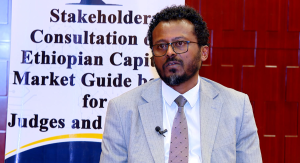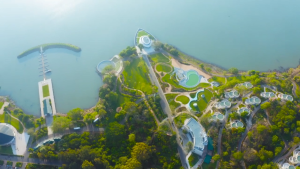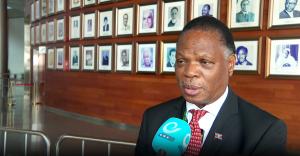Economy - ENA English
Economy
EDR Advances Railway Expansion Through Local Expertise
Mar 2, 2026 960
Addis Ababa, March 2, 2026 (ENA) – The Ethio Djibouti Railway Corporation has reaffirmed its commitment to expanding Ethiopia’s railway infrastructure by strengthening domestic technical capacity and operational independence. Chief Executive Officer of the Ethio-Djibouti Railway Corporation, Takele Uma, made the remarks as the corporation’s leadership and employees marked the 130th anniversary of the Victory of Adwa with a field visit to ongoing railway development sites. The CEO called on the current generation to honor the legacy of past heroes through tangible development achievements. Staff members toured the AMG–Indoode Link Railway Project, a key segment under construction by the corporation using its own engineers, technicians and operational teams. The project stands as a clear demonstration of the institution’s growing ability to design, manage and execute complex railway works without external contractors "Our forefathers built this nation through sacrifice. It is our responsibility to replicate their contribution by advancing development and strengthening national capacity," he said. Referring to the AMG–Indoode Link Railway Project as a practical example, he emphasized that the corporation is working to deliver major railway projects through homegrown technology, skills and financial capacity. He added that expanding railway infrastructure with domestic expertise will play a vital role in boosting economic integration and supporting Ethiopia’s long term growth ambitions. State Minister of Transport and Logistics Dhenge Boru on his part said expanding railway connectivity remains central to Ethiopia’s transport and logistics strategy, aimed at improving freight efficiency, lowering transportation costs and supporting economic growth. The ongoing projects are expected to enhance network integration and strengthen the country’s position as a regional logistics hub, he added. The visit was described as a reflection of the enduring spirit of Adwa and a renewed pledge to strengthen national development through infrastructure. The state minister also emphasized that Ethiopia is striving to position itself as Africa’s gateway and a leading logistics hub on the continent. He noted that the government is investing massively in transport corridors and railway expansion to enhance connectivity and competitiveness. "As the Victory of Adwa changed the course of world history through the sacrifice of our forefathers, we must now demonstrate the same patriotism in the sphere of development," the state minister noted. He further stressed that ongoing infrastructure projects, particularly in rail and logistics, demonstrate the country’s commitment to sustained growth. The state minister also urged the corporation’s leadership and employees to intensify their efforts to accelerate railway expansion and improve service delivery.
AfCFTA Heralds Significant Opportunities for Ethiopia, Regional Business Communities: ECCSA
Feb 28, 2026 1776
Addis Ababa, February 28, 2026 (ENA) – The African Continental Free Trade Area (AfCFTA) will bring significant opportunities not only for Ethiopia and the business community but also for other African countries, Ethiopian Chamber of Commerce and Sectoral Associations (ECCSA) Secretary-General told ENA. Africa is a continent of more than 1.57 billion people, with a predominantly young population and the continent's total GDP exceeds 3.4 trillion USD, making it a vast and preferred market for business. ECCSA Secretary-General Kenenissa Lemie said the African Continental Free Trade Area (AfCFTA) is a major gateway for local traders into the large market of the continent. According to him, Ethiopia's membership in the regional bloc will bring significant opportunity for the country's business community. AfCFTA offers substantial benefits to Ethiopian traders, providing an expansive opportunity to sell products across all of Africa, rather than being confined to the domestic market. As trade follows free-market principles, it would enable the provision of goods and services without tariffs or trade barriers, he stated. Moreover, the free competition within the zone would encourage traders to constantly improve themselves and adopt new practices, fostering a more active and effective business environment, the Secretary-General added. Ethiopia's opening up will also helps local traders exchange experiences and learn new business strategies from their African counterparts. Kenenissa further noted that the country's trade laws adhere with the continental trade system thus creating a conducive business environment. This, he said encourages foreign investors to engage in various sectors in Ethiopia, creating jobs for many citizens and laying the foundation for prosperity. He mentioned that the AfCFTA includes protocols for trade in goods, trade in services, and the free movement of persons as well. According to the Secretary-General, Ethiopia is focusing on the protocols for trade in goods, and has begun trading with South Africa, Kenya, and Somalia. The Chamber is providing training for traders to raise awareness about trade protocols and enable them to benefit from the opportunity as well as help traders to become competitive in international markets, it was learned.
Ethiopia Secures over 288 million USD from Horticulture Exports in Seven Months: Ministry
Feb 27, 2026 1529
Addis Ababa, February 27, 2026 (ENA) – Ethiopia has generated 288.48 million dollars from horticulture exports during the first seven months of the current Ethiopian fiscal year, according to Ministry of Agriculture. The ministry convened a consultative meeting with relevant institutions as well as local and foreign investors engaged in the horticulture sector to review performance over the seven-month period. Agriculture Minister Addisu Arega said the country earned 288.48 million dollars from the export of 160,317.79 tons of horticultural products, including flowers, fruits and vegetables. The performance represents 70.9 percent of the planned export target for the reporting period. He noted that horticulture, alongside coffee, remains one of Ethiopia’s priority export commodities, emphasizing its strategic contribution to foreign exchange earnings. “The government is committed to addressing bottlenecks that hinder investors and ensuring they can fully operate their farms and facilities,” the minister said. Addisu stressed that efforts are underway to boost productivity by strengthening private sector participation and improving sector coordination. He also called on investors to utilize their allotted land effectively rather than leaving portions idle. Participants at the discussion raised concerns related to infrastructure gaps, logistics constraints and land supply management, urging swift intervention to sustain growth momentum. On his part, Ethiopian Horticulture Producer Exporters Association Executive Director Tewodros Zewdie said the association is focusing on policy advocacy, capacity building, market linkage and promoting social and environmental sustainability within the industry. “Our priority is to enhance the competitiveness of members and foster sustainable growth in the horticulture sector through innovative and practical services,” he said. The review session underscored the sector’s expanding role in Ethiopia’s export portfolio and the need for coordinated action to meet annual targets.
PM Abiy Hails Expanding Ethiopia–Azerbaijan Partnership Driven by Economic Cooperation
Feb 27, 2026 2125
Addis Ababa, February 27, 2026 (ENA) –Prime Minister Abiy Ahmed has praised the growing bilateral relationship between Ethiopia and Azerbaijan during his maiden official visit to the country. In a social media post, the Prime Minister expressed his sincere gratitude to President Ilham Aliyev for the warm reception accorded to him and his delegation. PM Abiy noted that relations between the two nations have expanded consistently in recent years, driven by growing collaboration in key economic sectors. “Over the past few years, our partnership has steadily expanded, underpinned by recent economic cooperation in the aviation sector, collaboration in industrial parks and free trade zones, and joint engagements between Ethiopian Investment Holdings and its Azerbaijani counterpart,” he stated. He emphasized that these initiatives have established a strong foundation for further strengthening bilateral ties. According to the Prime Minister, the two sides held in-depth discussions focused on consolidating and elevating cooperation across multiple areas of mutual interest. During the visit, the leaders also presided over the signing of an Agreement on Cooperation in the Field of Defense and witnessed the exchange of several memoranda of understanding (MoUs), signaling an expansion of collaboration beyond economic engagement into strategic and security spheres. The visit marks a significant step forward in advancing diplomatic, economic, and strategic relations between Ethiopia and Azerbaijan.
Ethiopian Customs Commission Fully Digitalized
Feb 26, 2026 2414
Addis Ababa, February 25, 2026 (ENA) –The Ethiopian Customs Commission (ECC) has fully digitalized its services in order to provide fast and modern services for customers, particularly for importers and exporters. In exclusive interview with ENA, Ethiopian Customs Commission (ECC) Deputy Commissioner Azezew Chane said the commission has been undertaking various measures to digitalize services since the introduction of the Digital Ethiopia 2025 strategy. Digital economy is one of the main pillars of the economic sector in the Homegrown Economic Reform, he added. Accordingly, the commission has established a digital system that enables importers and exporters to execute their activities online. The Electronic Single Window (ESW system), which integrates more than 70 institutions, allows traders to submit all import/export related requirements in batch, playing a significant role in reducing process costs related with application, process delay and duplication of documents, the Deputy Commissioner noted. A Smart Border Custom Management System is also being implemented at customs station on borders with AI enabled cameras that can cover about 50 kilometers, the Deputy Commissioner said. The system has been implemented at various areas where there are customs activities to control and follow import and export trade activities. The digital system, besides providing fast and modern services, significantly contributes to mitigate illegal trade and contraband while encouraging legal trading, he stated. E-tax, E-Service, filing complaint, receipt verification services are also established to easily facilitate the tax paying system.
Colombian Ambassador Praises Ethiopia’s Historic Legacy, Highlights Coffee Sector Ties
Feb 26, 2026 2490
Addis Ababa, February 26, 2026 (ENA) –Colombia’s Ambassador to Ethiopia, Yeison Arcadio Meneses Copete lauded Ethiopia’s historic legacy as a profound source of inspiration for Afro-descendant communities in Colombia, across the Americas and throughout the Caribbean. In his recent exclusive interview with ENA, Ambassador Meneses also highlighted expanding cooperation between the two nations in coffee production and climate action. He underscored that Ethiopia holds a unique place in the historical consciousness of Afro-descendant peoples, describing the country as the mother of humanity and civilization. Often referred to as the “Land of Origins,” Ethiopia is widely recognized as a cradle of early human history and civilization, as well as a powerful symbol of freedom and resilience for Africans and the global Black community. Ethiopia’s decisive victory over Italy at the Battle of Adwa in 1896 remains a defining moment that inspired anti-colonial movements and strengthened the spirit of resistance among Black communities worldwide. “Ethiopia for Afro-descendant people in Colombia, and I think for all Americans and the Caribbean region, is an inspiration,” the Ambassador affirmed, adding that Ethiopia played a critical role in shaping the ideals of Pan-Africanism and global decolonization movements. He emphasized that connecting with Ethiopia represents a reconnection with ancestral roots and shared historical identity. “From a historical and anthropological perspective, we see Ethiopia as the mother of humanity and civilization. That is our perspective,” he stated. Beyond cultural and historical ties, the Ambassador highlighted growing collaboration between Ethiopia and Colombia, particularly in the coffee sector. “We are having a lot of collaborations and at different levels, technical levels, but also we have several conferences talking about, particularly how climate change is affecting or negatively impacting the production of coffee,” he elaborated. Both countries rank among the world’s top five coffee producers and contribute significantly to global supply, alongside industry leaders such as Brazil and Vietnam. Colombia is the world’s third-largest coffee producer, internationally renowned for its high-quality Arabica beans, while Ethiopia ranks fifth globally, is Africa’s largest producer, and is recognized as the birthplace of Arabica coffee. Meneses noted that the two nations are implementing cooperation at various levels, including technical exchanges and conferences focused on addressing the impact of climate change on coffee production. He described coffee as a highly sensitive and strategic sector for both economies, given its central role in livelihoods and national revenue. Discussions between the two countries increasingly focus on mitigating climate-related risks that threaten coffee-growing regions. The Ambassador also commended the rapid transformation of Addis Ababa and highlighted growing collaboration with Bogotá. Drawing on Bogotá’s urban reforms over the past two decades, he noted that both capital cities are exchanging experiences to promote inclusive and sustainable urban development. Ethiopia and Colombia have maintained diplomatic relations since 1949, and the recent reopening of the Colombian Embassy in Addis Ababa reflects Bogotá’s renewed commitment to deepening bilateral ties. The Ambassador’s interview underscores a partnership rooted not only in trade and diplomacy but also in shared history, cultural identity and a common vision for sustainable development in the face of global challenges.
Israeli President Hails Ethiopia as Key African Partner Following High-Level Talks
Feb 25, 2026 2012
Addis Ababa, February 25, 2026 – President Isaac Herzog affirmed today that Ethiopia remains an exceptionally significant nation on the African continent and a cherished, partner for the State of Israel. Following high-level talks with Prime Minister Abiy Ahmed in Addis Ababa, President Herzog described their discussions as “excellent” in a message posted on his official X account, underscoring the depth and vitality of bilateral relations. President Isaac Herzog noted that the historic ties between the two nations are rooted in decades of cooperation and carry significant promise for the future. "Ethiopia is a very important nation on the African continent and has been a key partner of the State of Israel for decades," he remarked. He emphasized Israel’s commitment to expanding its diplomatic and economic engagement across Africa, with Ethiopia serving as a cornerstone of that outreach. According to the president, the relationship between Israel and Ethiopia "has huge potential" for further growth. During his discussion with PM, they explored strategic avenues to strengthen cooperation in key sectors, including innovation, science, technology, agriculture, food security, water, and energy. "We discussed ways to strengthen our bilateral cooperation... and to advance regional cooperation—to the benefit of both our peoples," President Isaac Herzog stated. Beyond bilateral matters, the two sides deliberated on enhancing regional collaboration. The President expressed his desire for the future of the partnership, stating, "May we continue our cooperation in the spirit of regional peace, solidarity, and goodwill." As part of his visit, the President paid tribute at the Adwa Victory Memorial, honoring Ethiopia’s enduring spirit of independence. The visit marks an important step in further consolidating the longstanding diplomatic bridge between Ethiopia and Israel and is expected to open new avenues for technical exchange and broader regional engagement. In recent weeks, Addis Ababa has increasingly emerged as a focal point of high-level international diplomacy. The capital has hosted senior officials from Israel, Türkiye, and Italy within the span of just three weeks—an unmistakable reflection of its growing diplomatic weight. Earlier, President Recep Tayyip Erdoğan paid an official visit that culminated in the signing of a memorandum of understanding on joint energy and infrastructure projects. Likewise, Prime Minister Giorgia Meloni visited Addis Ababa to co-host the Italy–Africa Summit, introducing the "Mattei Plan" to foster sustainable cooperation. This succession of high-profile visits underscores Addis Ababa’s role not only as the political capital of Ethiopia but as a continental diplomatic hub and the seat of the African Union.
Ethiopia Advances Financial Sector Modernization: TDB Group
Feb 25, 2026 1097
Addis Ababa, February 25, 2026 –Trade and Development Bank (TDB) Group affirmed that Ethiopia has been advancing the modernization of its financial sector. President and CEO of TDB Group Admassu Tadesse told ENA that Ethiopia is making historic progress in modernizing its banking system and broader financial sector. The president further elaborated that the country has embarked on critical reforms that had long been overdue. "It has been an incredible few years that the reforms have been very difficult, but they were necessary," he said, noting that the measures were essential for Ethiopia to narrow the gap with other African economies that have made significant advances in recent years. According to the president, the macroeconomic reform agenda is yielding positive results. "The macroeconomic reforms have been going quite well," he stated, adding that the policy direction is now clearly geared toward enabling private sector growth. He further explained that while public infrastructure investment has played a pivotal role over the years, sustained economic expansion will depend on a vibrant private sector capable of generating employment and boosting national revenue. The current reform framework is structured to remove obstacles that previously constrained private enterprise, he stated. "The macroeconomic reforms have been designed in such a way to ensure that there is no impediment to the development of the private sector, the president affirmed, adding, “It has not always been this way in the past, but now it is a much more enabling environment, at least from the broad macroeconomic side of things." However, he cautioned that progress at the macro level must be complemented by improvements within financial institutions and regulatory systems. "There have been very important measures taken, but at the micro level, there still needs to be work," he added. Admassu also stressed the importance of mobilizing both domestic and international financing to address savings and investment gaps, noting that sustainable growth across Africa depends on stronger financial intermediation and expanded access to capital.
ECC Calls for Integrated Efforts to Combat Illicit Trade
Feb 25, 2026 777
Addis Ababa, February 24, 2026 (ENA) –Ethiopian Customs Commission (ECC) has called for sustained and coordinated efforts to combat illicit trade, noting that while Ethiopia’s macroeconomic reform program has helped mitigate the challenge, continued vigilance by all relevant institutions remains essential. Speaking at the 4th National Anti-Illicit Trade Summit held under the theme “Shared Commitment to Combat Illicit Trade,” the Deputy Commissioner said illicit trade encompasses a wide range of illegal activities. These, he said, include human trafficking, illegal trade in natural resources, intellectual property infringements, trade in substances that pose health or safety risks, smuggling of excisable goods, and illicit financial flows involving money or goods obtained through illegal and unethical activities, among others. According to him, illicit trade causes significant harm to merchants, society, and the government. He noted that the government has undertaken various measures to curb the practice. However, he stressed that combating illicit trade requires sustained and coordinated efforts by all relevant institutions, as the problem remains dynamic and evolving. Lead Executive Officer for Domestic Trade at the Ministry of Trade and Regional Integration, Liku Beyene, said the ministry is working to curb illicit trade by establishing technology-based systems. Vice President of the Ethiopian Chamber of Commerce and Sectoral Associations, Aynalem Abayneh, said illicit trade is not merely an economic offense but a multidimensional crisis with far-reaching implications for fiscal stability, industrial development, public health, consumer safety, and national security. He added that efforts are underway to raise awareness among merchants. The Chamber is committed to preventing illegal trade in collaboration with stakeholders, he affirmed.
UK Understands Ethiopia’s Quest for Sea Access: Ambassador Welch
Feb 24, 2026 2932
Addis Ababa, February 24, 2026 (ENA) –The United Kingdom’s Ambassador to Ethiopia, Darren Welch, says Ethiopia’s aspiration to secure access to seaports for its growing economy is understandable and should be addressed through peaceful dialogue. In his recent interview with Pulse of Africa, Ambassador Welch said: “So look, I come from a country which has 51 major ports and more than 120 other ports. So I approach this issue with some humility,” he said. “The United Kingdom, of course, is a major seafaring trading nation with deep roots in its maritime and naval traditions. So we understand the desire to be connected to the world for trade,” the ambassador noted. Currently, many are urging parties in the region to engage in constructive and peaceful dialogue to address Ethiopia’s growing demand for access to seaports. Ambassador Welch echoed the position of Prime Minister Abiy Ahmed and the Ethiopian government, who have consistently emphasized negotiation as the appropriate path forward. “As the Prime Minister and the government have said, the objective should be pursued through peaceful dialogue and negotiations,” he noted. He further encouraged all sides to focus on de-escalation efforts to maintain stability in the Horn of Africa. After losing direct access to the sea in 1993, Ethiopia has since relied primarily on neighboring ports for its international trade. Despite being Africa’s second-most populous nation, the country has sustained rapid economic growth, with expanding manufacturing and agricultural exports increasing demand for reliable and diversified maritime access. With a population projected to surpass 150 million in the coming years, Ethiopia’s development trajectory has intensified discussions about securing sustainable sea outlets. Meanwhile, the coastline stretching from Massawa to Mogadishu spans roughly 5,000 kilometers along the Red Sea and the Indian Ocean, serving countries whose combined population is significantly smaller. Ambassador Welch said his country understands Ethiopia’s perspective. “I can understand why a country of Ethiopia’s size and growing economy would want to diversify its access to commercial ports,” he stated. Prime Minister Abiy Ahmed has repeatedly stressed that Ethiopia’s quest for sea access is rooted in peaceful negotiation and mutual benefit. The government has indicated openness to arrangements based on give-and-take principles, including economic partnerships, investment cooperation, and potential shareholding frameworks in strategic national assets such as Ethiopian Airlines or the Grand Ethiopian Renaissance Dam, as well as other innovative mechanisms agreed upon by sovereign states. The United Kingdom is also engaged in practical initiatives aimed at strengthening Ethiopia’s port connectivity. “In fact, the United Kingdom is supporting work at the Port of Berbera and supporting a transit transport agreement to make sure that goods can flow more readily between that port and Ethiopia,” Ambassador Welch said. The Port of Berbera has increasingly been viewed as an alternative trade corridor for Ethiopia. Reaffirming the UK’s position, the ambassador concluded: “We understand the desire, we come from a deep tradition of seafaring and global trade, but we would always argue that any differences, any tensions, must be negotiated peacefully.”
Over 71 Billion Birr in Shared Revenue Transferred to Ethiopia's Regions in Seven Months
Feb 23, 2026 1060
Addis Ababa, February 23, 2026 (ENA) –The Speaker of the House of Federation, Agegnehu Teshager, announced that 71.33 billion birr was transferred to regional states during the first seven months of the 2018 Ethiopian fiscal year. This allocation was executed in accordance with the established shared revenue administration and transfer formula. The Speaker made these remarks during a consultative forum organized by the Subsidy Budget and Shared Revenues Standing Committee of the House of Federation. The gathering focused on a financial audit report regarding the administration, collection, and transfer of shared revenues involving federal and regional stakeholders. Agegnehu Teshager noted that significant strides have been made to bolster the system of shared revenue distribution between the federal and regional governments. He emphasized that the recently implemented reform of the revenue-sharing formula has been applied to enhance equity and efficiency. The Ministry of Revenues and the Ministry of Mines were commended for their pivotal roles in developing modern technological infrastructure that aligns with the new formula, thereby accelerating the revenue transfer process. The Speaker explained that these systemic improvements have led to a consistent growth in regional revenues over the past five years. He highlighted the dramatic shift in figures, noting that regional shares have ascended from 4.2 billion birr prior to the reforms to a substantial 91.73 billion birr by the end of 2017 fiscal year. The progress achieved through the strong coordination between federal and regional authorities is viewed as a testament to the success of the federal system and the ongoing national reform goals. In particular, royalty revenues collected from large-scale mining and petroleum resources, a key component of shared income, have shown remarkable growth. To ensure balanced development and meet the public’s growing demands, the Speaker underscored the necessity of expanding all available revenue streams while improving collection and administration. He further noted that a clear direction has been set to ensure transparency and accountability by subjecting royalty revenue transfers to independent financial audits. According to Agegnehu Teshager, a previous financial audit conducted by the Federal Auditor General on the Ministry of Revenues and the Ministry of Mines helped build consensus and establish a framework for the current reporting standards. The findings from these audits are instrumental in determining future administrative directions for both institutions. Hailu Ifa, Secretary of the Subsidy Budget and Shared Revenues Standing Committee, added that the new shared revenue administration system is grounded in firm principles and characterized by transparency. He affirmed that the implementation has resulted in significant growth for both the performing ministries and the respective shares received by the regions.
Ethiopian Airlines Advances Sustainability with New Food Waste Recycling Partnership
Feb 23, 2026 1804
Addis Ababa, February 23, 2026 (ENA) –Ethiopian Airlines has taken another major step toward greener aviation by signing a Sustainable Food Waste Recycling Memorandum of Understanding (MoU) with Provectus Enterprising Inc. and Fusion Global Solutions. The agreement focuses on transforming food and catering waste from the airline’s operations into biomass and other environmentally friendly products. By converting waste into sustainable resources, the initiative supports circular economy principles and reduces the environmental footprint of airline catering services. The signing ceremony was witnessed by Global Affairs Canada representative Cheryl Urban, highlighting international cooperation in advancing sustainable aviation solutions. With nearly eight decades of operation, Ethiopian Airlines stands as Africa’s largest aviation group, serving over 160 passenger and cargo destinations across five continents. The airline plays a vital role in connecting African cities to global markets while prioritizing responsible and eco-conscious growth. As a proud member of Star Alliance, Ethiopian has consistently earned industry recognition, including multiple Skytrax and APEX awards for excellence in service and leadership in African aviation connectivity. Looking ahead, the airline’s Vision 2035 strategy aims to secure its place among the world’s top 20 most competitive aviation groups. Central to this vision is the expansion of its Pan-African multi-hub network through partnerships with ASKY Airlines, Malawi Airlines, and Zambia Airways. By combining modern aircraft, enhanced passenger comfort, and environmental responsibility, Ethiopian Airlines continues to set the pace for sustainable aviation across Africa and beyond.
Prime Minister Abiy Highlights Irrigation Expansion as Catalyst for Ethiopia’s Food Sovereignty
Feb 22, 2026 1688
Addis Ababa, February 22, 2026 (ENA) –Prime Minister Abiy Ahmed has reaffirmed his government’s commitment to accelerating irrigation development as a central pillar of Ethiopia’s drive toward food sovereignty. In a social media message shared on his social media channels, the Prime Minister emphasized that expanding the use of available surface and groundwater resources remains a top priority in transforming the country’s agricultural sector. According to him, areas that once lay unproductive are now being converted into thriving hubs of agricultural activity through strategic irrigation initiatives. Citing the Bilate River area as a notable example, PM Abiy highlighted the rapid progress of large-scale fruit development projects underway with strong participation from private investors. These projects, the Premier noted, are reshaping the local agricultural landscape and creating new economic opportunities for surrounding communities. “The area where the Bilate River is located is a notable example,” the Prime Minister stated. “Extensive fruit development projects are being carried out with the participation of private investors. This will greatly support the efforts being made to ensure food sovereignty,” he further elaborated.
Prime Minister Abiy Highlights Progress of Corridor Development Projects in Hawassa
Feb 21, 2026 1457
Addis Ababa, February 21, 2026 (ENA) –Prime Minister Abiy Ahmed has emphasized that Ethiopia’s corridor development projects are playing a transformative role in reshaping cities and laying the foundation for a better future for coming generations. The Prime Minister noted that the large-scale initiatives are designed to support the country’s rapid urban growth, ensuring that cities are better planned, more resilient, and capable of meeting the demands of a rising population. According to him, the projects are not only modernizing infrastructure but also contributing to long-term national development goals. Speaking after a visit to Hawassa corridor projects in the early hours of the evening, Prime Minister Abiy observed the progress of the second phase of corridor development works underway in the city. He commended the advancements made so far and reiterated the government’s commitment to sustainable urban transformation. “Today, we observed the corridor development works carried out in the second phase in the beautiful city of Hawassa,” the Prime Minister shared on his social media channels. The corridor development program forms part of broader national efforts to prepare Ethiopia for the accelerating trend of urbanization while enhancing the quality of life for citizens across the country.
NBE Special Forex Auction Undersubscribed by About 45 Million USD
Feb 21, 2026 1629
Addis Ababa, February 21, 2026 (ENA) –The National Bank of Ethiopia (NBE) has conducted a special foreign exchange auction which resulted in a rare surplus of hard currency today. Although the central bank made a massive 500 million USD available to the market, the bidder banks only absorbed 455.29 million USD, leaving approximately 9 percent of the total unclaimed, it was learned. Today’s auction sent a strong signal to the financial sector that the era of chronic, systemic “forex thirst” is transitioning into a more managed and liquid market environment. The undersubscription also indicated that demand for foreign currency was lower than the amount supplied that signals easing pressure on the forex market. The auction saw all the 30 participating banks were successful in securing 100 percent of the funds they requested. This fulfillment of bids is a stark contrast to previous years, where banks often received only a fraction of their requirements. The next foreign exchange auction will be held in line with the announced schedule.
ECMA Tribunal Embraces Modern Technology to Enhance Efficiency, Accessibility
Feb 21, 2026 946
Addis Ababa, February 21, 2026 (ENA) –The Ethiopian Capital Market (ECMA) Administrative Tribunal announced that has integrated modern technology into its operations with to view ensuring efficiency and accessibility. As a vital and relatively new pillar within the nation's economic architecture, the Tribunal was established under the Capital Market Proclamation No. 1248/2021. It was conceived to address the specialized nature of the financial sector, providing expert adjudication that relieves the traditional court system of complex technical burdens. The primary mission of the Tribunal is to provide an impartial, expert-led review of disputes arising among market participants by upholding the highest standards of integrity, it was learned. Presiding Judge of the Tribunal, Abnet Zerfu, told ENA that the court is empowered to examine and resolve grievances stemming from decisions made by the Ethiopian Capital Market Authority. Since its inception a year ago, the Tribunal has made commendable progress, including the assembly of a dedicated professional team and the finalization of its comprehensive procedural guidelines, he added. Abnet noted that the institution has been organized to bridge the gap between the law and the public, introducing a digital system that allow individuals to file appeals from any location. Furthermore, the Tribunal has established a video conferencing infrastructure, enabling parties to participate in hearings remotely. The courtroom itself is now fitted with audio and video recording technology to ensure that every proceeding is documented with absolute precision and clarity. In a bid to strengthen regional ties and build institutional capacity, the Tribunal is working in close harmony with the Ministry of Foreign Affairs, the Presiding Judge said. Among these efforts is an upcoming Memorandum of Understanding with its Tanzanian counterpart, a partnership poised to facilitate a rich exchange of judicial wisdom and collaborative growth. Beyond bilateral ties, Abnet revealed that preparations are underway to establish a forum for Capital Market Administrative Tribunals across East Africa. This initiative is envisioned as a cornerstone for regional market integration, paving the way for a unified and consistent judicial standard across the borders of the Horn and beyond.
Ethiopia’s Tourism New Face: From Limited to Ample Destinations
Feb 21, 2026 999
Addis Ababa, February 21, 2026 (ENA) –Even if Ethiopia is a land graced by history and natural splendor, its tourism has been primarily challenged with scarcity of destinations. Visitors would often briefly tour the few well-known sites and depart shortly. Today, that narrative is changed through a blend of vision and steadfast commitment. The nation has transitioned from a lack of alternatives to a new chapter where the abundance and quality of destinations are harmoniously integrated. Tourism was strategically selected as one of the five pillars of Ethiopia’s Homegrown Economic Reform program for profound reasons. The sector possesses a unique capacity to generate extensive employment, secure foreign currency, and portray the true image of the country on the global stage. As tourism flourishes, it acts as a catalyst —invigorating agriculture, accelerating transport and construction, and breathing life into small enterprises that craft traditional attire and artifacts. To realize this vision, the strategic projects initiated by PM Abiy Ahmed have fundamentally reshaped the nation’s tourism map. The Dine for Sheger initiative transformed the heartbeat of Addis Ababa through the Unity, Sheger, and Entoto parks. Similarly, the Dine for Nation projects —including the historic Halala Kela, the pristine Chebera Churchura, and the breathtaking Wenchi — have renewed Ethiopia's allure by blending natural beauty with historical footprints. The Dine for Generation initiative continues this momentum with modern destinations such as Gorgora, Dembi, Shebelle, and Lake Logo. These sites elegantly marry nature with history and comfort with modernity, standing as the new jewels of Ethiopian tourism. These developments have provided compelling reasons for domestic tourism to thrive and for international travelers to make Ethiopia a primary destination. Industry experts note that this transformation extends beyond physical construction to the quality of service. The owner of Celebrity Ethiopia Tour and Travel, Ashenafi Kassa, observed that the previous shortage of destinations has been solved, offering tourists diverse options that encourage longer stays beyond the traditional historical circuit. Pleasure Ethiopia Tour and Travel Agency Manager, Nahom Admasu, emphasizes that the greatest success lies in the completion of the service chain. He recalls that while beautiful sites existed in the past, they were often bypassed due to a lack of suitable accommodations. Now, the construction of international-standard lodges and resorts allows tourists to linger and enjoy their stay without haste. The proliferation of destinations has also opened new creative avenues for tour operators. Ashenafi highlights the "Night Out" package, a fresh offering that allows guests to savor the nocturnal beauty of the city. Such innovations lead to increased revenue, job creation, and extended tourist stays, he noted. The tourism sector is indeed yielding promising results. Industry stakeholders affirm that the government’s efforts to expand destinations are not only making the country competitive on the global stage but also becoming a backbone for overall economic growth. Ethiopia stands today not just as a cradle of history, but as a vibrant source of modern destinations.
Ethio telecom CEO Says teleStream Goes Beyond Entertainment to Power Nat’l Digital Growth
Feb 20, 2026 1950
Addis Ababa, February 20, 2026 (ENA) –Ethio telecom has officially launched teleStream, a cutting-edge internet-based streaming platform designed to transform Ethiopia’s digital and media landscape. The platform was unveiled on Thursday evening at Science Museum, marking a major milestone in the company’s ambitious corporate roadmap, “Next Horizon Digital and Beyond 2028.” Speaking at the launch ceremony, Ethio telecom CEO, Frehiwot Tamiru emphasized that teleStream is positioned as a comprehensive national digital content platform that goes far beyond entertainment. “It goes beyond mere entertainment,” Frehiwot said. “We are building a massive platform that allows the education and health sectors, as well as various institutions, to easily digitize and market their offerings,” according to the CEO. Frehiwot noted that teleStream is designed to empower key sectors including education, healthcare, tourism, cultural heritage, as well as governmental and non-governmental institutions. The platform enables these sectors to seamlessly digitize, distribute, and monetize their products and services at scale. At its core, teleStream functions as a dynamic digital ecosystem for producers, media organizations, and creative industry professionals. It offers a centralized space where ideas can be transformed into high-quality digital content capable of reaching millions of users nationwide and beyond. While many institutions already distribute content through various online channels, Frehiwot noted that teleStream differentiates itself by providing integrated, scalable infrastructure that enhances visibility, accessibility, and commercial opportunities. The platform places particular emphasis on supporting universities and academic institutions, the tourism sector, cultural and heritage organizations, government and non-government entities, as well as private enterprises and innovators. By bridging technology with creativity and institutional needs, teleStream is positioned as a catalyst for national digital growth—strengthening content production, expanding audience reach, and unlocking new economic opportunities in Ethiopia’s rapidly evolving digital economy. The launching ceremony brought together prominent figures from the creative industry, entertainers, heads of media institutions, and other invited dignitaries, the Ethiopian News Agency (ENA) reported from the scene.
Ethio telecom Unveils teleStream, Pioneering New Era for Ethiopia’s Digital Media Industry
Feb 20, 2026 1720
Addis Ababa, February 20, 2026 (ENA) –Ethio telecom has officially launched teleStream, a cutting-edge internet-based streaming platform poised to revolutionize Ethiopia’s media and entertainment sector. Announced this evening at Science Museum, the launch marks a significant milestone in the company’s ambitious corporate roadmap, “Next Horizon Digital and Beyond 2028.” The initiative underscores Ethio telecom’s commitment to accelerating digital inclusion and driving sustainable national economic growth. A Game-Changer for Digital Entertainment TeleStream delivers more than 60 live television channels and over 350 video-on-demand titles, powered by Ethio telecom’s advanced fiber and telecloud infrastructure. Utilizing high-speed fiber, 4G, and 5G technologies, the platform guarantees low-latency, high-definition streaming — eliminating the need for satellite dishes and transforming how Ethiopian households access entertainment. The service is expected to redefine digital lifestyles across the country by modernizing media consumption and elevating the quality of content available to viewers. Empowering Users, Creators, and Institutions Designed with innovation and inclusivity at its core, teleStream integrates features that enhance user experience and support a digitally empowered economy. Stable fiber broadband connectivity ensures uninterrupted streaming, while built-in parental controls and educational programming make it a family-friendly solution. For content creators and broadcasters, teleStream offers a cost-effective, locally hosted distribution platform that expands audience reach and reduces reliance on expensive foreign satellite services. By strengthening domestic content hosting and distribution, the platform reinforces Ethiopia’s growing digital sovereignty. Businesses and institutions — including hotels — stand to benefit from streamlined entertainment solutions, while educational institutions can leverage the platform for digital libraries and remote learning resources, enriching teaching and learning experiences nationwide. Supporting Smart Cities and Digital Sovereignty Aligned with Ethiopia’s smart city vision, teleStream contributes to reducing visual pollution by limiting dependence on satellite dishes. Local content hosting further strengthens national data control and technological self-reliance. Infrastructure Upgrade to Power the Future In parallel with the launch, Ethio telecom has upgraded its fixed broadband infrastructure, replacing legacy copper networks with modern fiber systems. The introduction of “Fiber to the Room” service delivers ultra-fast, targeted connectivity tailored to individual user needs — setting a new benchmark for broadband performance in Ethiopia. To mark the launch, Ethio telecom is offering a special introductory discount for customers who bundle teleStream with fixed broadband packages. With teleStream, Ethio telecom is not only launching a platform — it is laying the foundation for Ethiopia’s next digital frontier.
Eswatini Applauds Ethiopia’s Impressive Mega Development Projects
Feb 20, 2026 1288
Addis Ababa, 20 February 2026 —The Kingdom of Eswatini has commended Ethiopia for its strong track record in delivering large scale development projects, highlighting the Grand Ethiopian Renaissance Dam (GERD) as a landmark achievement that reflects national resolve and technical capability. In an exclusive interview with ENA, Eswatini’s Minister of Natural Resources and Energy, Prince Lonkhokhela Dlamini, praised Ethiopia’s momentum in executing transformative projects that are reshaping its economic landscape. Describing Ethiopia’s ability to implement mega projects through its own capacity as “impressive and exemplary,” he said the GERD stands as clear proof of what determined leadership and coordinated national effort can accomplish. According to the minister, the dam represents more than a national project. He said it offers a practical blueprint for African countries seeking greater self-reliance in infrastructure development and energy production. “The GERD not only serves Ethiopia but stands as a vital resource for neighboring nations,” he stated, adding that the project has the potential to strengthen regional cooperation through energy sharing. Prince Dlamini emphasized that electricity generated from the dam could benefit countries across the continent, from southern to northern Africa, reinforcing economic integration and shared growth. Reflecting on his recent visit, he observed that Ethiopia has undergone visible transformation since his last trip eight years ago. He pointed to significant improvements in infrastructure, roads, and water supply systems as evidence of sustained development. “The progress observed is a clear reflection of effective leadership and serves as an inspiring example for other African nations,” he said. In this regard, Prince Dlamini commended Ethiopia’s leadership in water sustainability and clean energy, noting that the country’s initiatives in renewable power generation and largescale afforestation demonstrate a forward-looking strategy. The minister further expressed Eswatini’s strong interest in deepening collaboration with Ethiopia in the energy sector and other development initiatives, underscoring the importance of African partnerships built on mutual benefit and shared ambition.

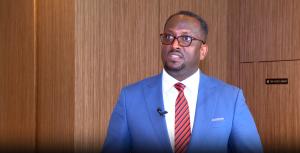
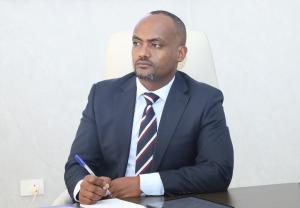
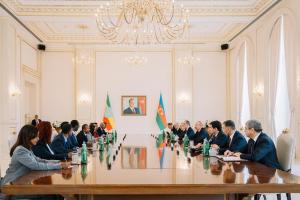
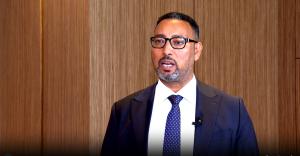
.jpg)
.jpg)
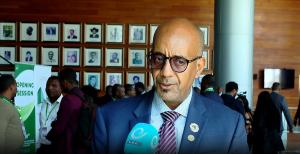
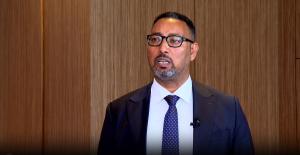
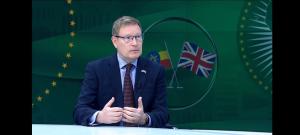
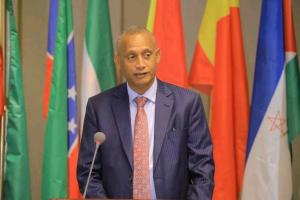
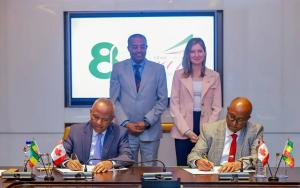
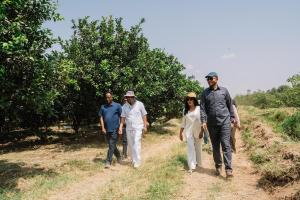
.jpg)
.png)
